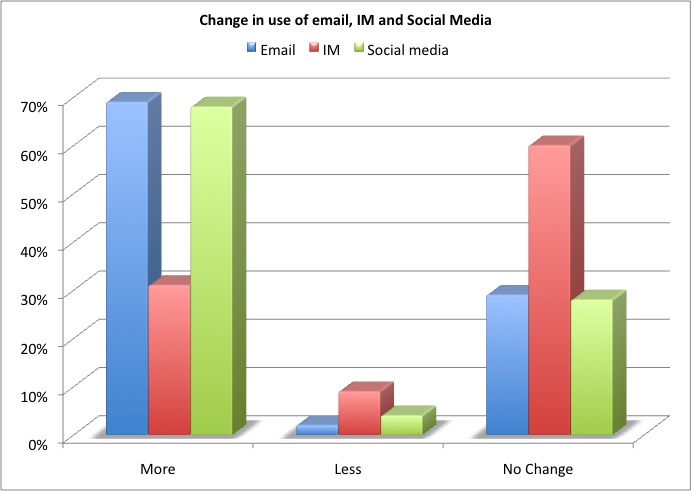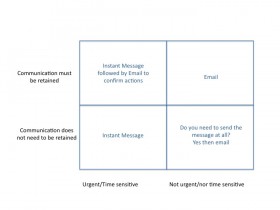As the last typewriter rolls off the production line I am filled with sadness. I loved the clatter of the keys and the whiz of the carriage as you pushed it across. Here is a wonderful video for those who yearn after these sounds which to me equalled creativity and thinking. There was little scope for making errors unless you wanted either to type the whole page again or cover yourself in Snowpake corrector fluid. You had to plan what was to be typed before hitting the keys.
I blame the demise of the typewriter on the insidious rise in Cc’d email and hence email overload. In the era of the typewriter you could only make a limited number of carbon copies. Typing a memo therefore did not give you the option to flood  everyone’s in-tray (inbox) with trivial memos and replies and counter replies.
everyone’s in-tray (inbox) with trivial memos and replies and counter replies.
The effort of typing a reply also meant you used your time carefully and again cosidered what was to be said and how it should be laid out. You also thought hard about the length of the memo (unless you could touch type). The death of the typewriter may therefore also be partly to blame for the often appalling level of grammar and English we now witness in electronic communications, not to mention bad email etiquette.
Then there is RSI. Did anyone ever complain of it with a typewriter? No. Did you need to be connected to use one? No. Did you need to upgrade every year or so? No. Your portable typewriter was like a faithful companion, always there ready to go and help you produce that new column, manuscript, letter etc.
There have been several obituaries to the typewriter amongst my favorites of which are Oh Brother, where are thou? by Will Self in The Times and Typewriter’s block in the Financial Times.
What do you miss about the typewriter?
Tags: cc'd email, email etiquette, email overload, RSI, typewriter
How the shape of the earth dictates email’s longevity
Nathan Zeldes, Nov. 4, 2012
Email was invented in 1971, with a message crossing from one end of a room to the other via ARPANET, and has gone on to become a major presence in the life of every knowledge worker on the planet. We devote to it 20 hours a week, complaining endlessly about the overload and the stress. And yet – despite the availability of many more modern tools like IM and various Social Media, email is still here, based on the same paradigm it had 41 years ago. In fact, when Google introduced Wave, that exuberantly media-rich social messaging platform, they said it’s time to reinvent email to match the 21st century; but Wave has since followed the dodo and email is still here.
I’d like to suggest one reason for this seeming paradox – an attribute of email that is mostly absent in the tools seeking to replace it, and which represents a deep advantage for many users.
This relates to the fact that the earth is still (with all due respect to Thomas Friedman) round. In a globalized economy, this means that some of the people you must communicate with will be asleep when you have something to tell them or ask of them. And there’s more – cultural diversity ensures that holidays and weekends vary widely, so much so that Prof. Erran Carmel of American University has found that only about a quarter of the workdays in a year are common to all the countries where a large corporation may run its business. In this messy reality, email shines for its primary attribute: it is asynchronous. It is a messaging platform where messages arrive, accumulate, and persist until read. No matter whether your recipient is asleep, celebrating a local holiday, or on vacation, they’ll get your message when they return to their work.
I remember this aspect well from the eighties, when I was first exposed to email. Working in Israel for an American company, email allowed me to correspond with my US coworkers with a “guaranteed next day response”. The guarantee has since evaporated, alas, due to email overload, but the basic concept has remained: you send the mail out in your daytime, when the other fellow’s asleep, and you get a reply when you’re awake some other day. For global distributed teams, email solves one major issue caused by our spherical home world – it empowers members to work together without staying awake at all hours. Like the Fax machine, its extreme usefulness is keeping it alive.
True, Gen Y and Gen Z folks have different habits than their elders, and they bring with them from school a preference for Facebook and SMS as primary communication channels; but then, their life as students requires no participation in hectic global teams. I suspect that once they enter the enterprise they will retain Facebook as a social tool and even use it to good advantage for some work activity, but will stick to email for most of their globally oriented team interaction.
The challenge for us who combat Information Overload is therefore to help organizations and individuals use introduce some email best practice strategies to allow us to manage email in better, more effective, less stressing ways; because – unless someone finally invents a planet-flattener of some sort – email rules, it isn’t going away anytime soon!
Nathan Zeldes, 12 November 2012
Tags: email best practice, email etiquette rules, email overload, email response times. Nathan Zeldes, information overload
The CIPD annual survey for well being shows that sick leave has fallen by nearly a day. Good news. The bad news is that stress and muscular skeletal problems (back pain RSI and eye strain) are two of the main reason for taking sick leave. Indeed cases of ‘ipad shoulder’ have now been reported. Email overload is still a major contributor to stress levels, not to mention the time spent at the inbox slumped over a keyboard which rises the risk of muscular skeletal problems.
Some postulate that email is in decline and hence we might hope that is email overload and it’s twin sister ’email stress’. The main reason given for the decline in email is the rise in use of social technologies like SharePoint, instant messaging (IM) and alike.
email is the rise in use of social technologies like SharePoint, instant messaging (IM) and alike.
Our recent survey on the ‘state of the inbox’ for the ITDF Autumn Conference revealed that email traffic is far from declining. Mesmo Consultancy like others are witnessing a dramatic increase. Business users now receive on average 77 emails per day which represents a rise of 26% over the last few years. Interestingly however, most feel that only 47% of these emails are necessary. Dealing with the unnecessary emails (excluding spam) is now costing organisations nearer 31 days per person per year in comparison to the 21 we witnessed a few years ago. So much for the push to lean and mean and improved efficiency.
Is your organisation paying too high a price for the pleasure of using email? Click here to check how much email overload is costing you in lost productivity.
So what of all the talk about social technologies being the nirvana to solve all the challenges which email possess? Our study revealed that about half the participants are using such technologies but they are not truly embedded in many as a replacement for email. Discussions at the ITDF supported this finding.

Haystacks by Monet
Social technologies bring with them their own set of challenges not least more emails as alerts to new postings etc. Then there is the information overload as more people feel they must share ever more information. It takes a skilled knowledge worker to pick out and pull in just what is really relevant. It’s akin to finding a needle in a haystack and is a skill few either possess or are taught.
Piling social technologies on top of email is not the solution. It just adds to the information overload and ramps up even further the stress and time we need to spend slumped over our keyboard.
One solution to driving down stress related sick leave is to implement such technologies as part of the information and communications strategy. However users must also be properly educate about when, where and how to use these technologies and email properly. Not surprisingly less than a third had any education and training in how to use effectively email and social technologies. (This is very similar to previous findings.)
We have commented on the effective use of IM and there will be more in the next blog. Meanwhile, we would be delighted to talk to you about how we can help you drive down and out the pernicious 21st century office disease of email overload and the associated stress.
Our current research into the future of email reveals that information overload is increasing. What is your organisation doing to help people use email and social technologies effectively to reduce email and information overload and hence time wasted at the computer?
Tags: email management training, email overload, email stress, future of email, Instant messaging, Mesmo Consultancy, social technologies
I chose to disconnect last week whilst on leave. No email, no social media. Running the business (and me) was delegated to our very able Administrator. We agreed a process to minimise the post vacation email overload. Rules were set before leaving to folder all known lower priority emails (eg newsletters).
Meeting request would tentatively accepted. How often have you as a PA spent time arranging meetings in bosses absence and they return and have different priorities. One executive once said he felt his PA saw her role as filling up his diary with meetings which he and she then had to  undo as his priorities changed. How often does that happen to you when on leave? Used in this context ‘tentative’ takes on a new and useful function.
undo as his priorities changed. How often does that happen to you when on leave? Used in this context ‘tentative’ takes on a new and useful function.
Otherwise, If something was ultra-urgent we agreed she would call/text me.
On the second day sitting having pre-dinner drinks how did I feel watching the three others all with their heads in their iPhones and Blackberrys? Certainly not left out. Rather the reverse: included in the here and now and able to people watch and enjoy the gentle lapping of the waves as I relaxed and stayed calm. I can only image this must be what it’s like for a reformed alcoholic watching others drink whilst they nurse a lemonade.
A huge plus was the extra time to read instead of feeling I should decamp early from the pool and go and deal with the day’s email tsunami. The book was recommended by a colleague. I wanted to email and say how wonderful it was. But what value did it add for either of us? Had I done so there would have been an email chain which wasted both our times and added to the email overload.
Knowing the business was in safe hands was a wonderful feeling. Although one worry was that my personal emails come in on my work address. It is worth separating business and pleasure, but as Steve Jobs famously said he had only one email address. I make this work for me too. There is a Hotmail address but that is only used for signing up for white paper and special offers etc. None of which is life changing if not read for a week.
What of my social diary – golf matches and alike? Our Administrator dealt with any that looked like they required a response. So no lost golf games or party opportunities! Two years ago such arrangements were nearly all done by phone. Now of course it’s email, although some friends (and relatives) say they still prefer to talk. In some ways social engagements were better managed as there was time to think and consider instead of feeling one must make an instant response.
I was tempted to log in during the week and join in when everyone else had their heads in their iPhones etc, but a glass of whisky and the urge evaporated. After all having delegated, what would that say about the trust placed in our Administrator? Furthermore, why did I want to disrupt my calm mind. Also, previously I have made poor decisions when in holiday mode through lack of context and having all the necessary information to hand.
At the airport again the urge to hit connect welled up. As in my previous blogs my advice for dealing with the holiday email tsunami is talk before checking the email to prioritise and save trawling through stuff which does not merit your immediate attention. In my case it would be talk and read the ‘read me first email’ as my first day back in the UK was Saturday. I was two hours ahead of the UK so my briefing email would not be ready until we were in the air. Some food and drink soon took away the urge to log in.
On my return as expected, the junk had been trashed and the remaining messages prioritised.
Not logging in was as to paraphrase the great Diana Athill ‘ like excess cargo which needed to be dumped’. I came back feeling more relaxed and able to see the big picture again. Also an a huge bonus, no post holiday email overload and it was very easy to reach inbox zero on day one of my return.
Of those in the party that did log on. One person was asked why they did so when the manager did not? One said they were paid to be available to their clients at all times and yes, someone did want to meet them on Monday. Could it have waited? Probably yes. Did I miss email, twitter etc? No. In fact it has left me re-assessing the value of some of these tools.
What is your experience of no email days/weeks when on leave?
Tags: email addiction, email free vacation, email management training, email overload, inbox zero
Can Instant Messaging (IM) help to significantly reduce email overload? Over the last few months I’ve been working remotely with a client and using their IM in earnest (via Microsoft Communicator). I was able to catch up with colleagues on business and social matters quickly and without ending up with an inbox full of redundant email chains.
At one point urgent help was needed from a colleague whose status was ‘busy’. A quick message and back came the necessary data with a note that all the other matters would need to wait until our planned conference call later that week. Still the vital data was supplied and work could progress.
Would the same have happened with email? No, as he is a strict disciple of the ‘stay focused’ management school. His new email alerts are off and he only checks his inbox every couple of hour or so. He works on the basis that if it is urgent someone will either call or send him an IM.
Email has been around for just over 30 years and is now seen by many as the default communications channel. But is it really that useful for all electronic communications? Mimecast found only about 30% of emails received are read. Meanwhile the Grossman Group found that middle managers are overwhelmed by email and often spend long hours outside work catching up with their email. But what are all these emails they feel they must read or at least spend time deleting)? We and Grossman found that about 25 to 30% are indeed trivial often either chains (ongoing conversations) or about subjects that are no longer relevant (eg fire alarm is being tested at 11.00am).
Email is but one of a range of communications channels (from face-to-face meetings to text messaging). Is it time to start thinking through how we can use alternatives to email firstly to communicate more efficiently and hence secondly reduce the email overload which is crippling many people and their businesses? Have you checked recently how much time you and your business are loosing through unnecessary (internal junk) email?

For me IM is hugely undervalued as a communications tools. If I were CEO of an organisation (no matter what size) I would not ban email internally as some have done but would implement an IM policy.
All message which do not need to be retained and are time sensitive should be sent by IM and not email as per this matrix.
Are you using any form of social media and IM to reduce the volume of email traffic and improve communications? Click here to participate in our new survey.
Tags: alternatives to email, email chains, email management, email overload, IM, Mesmo Consultancy